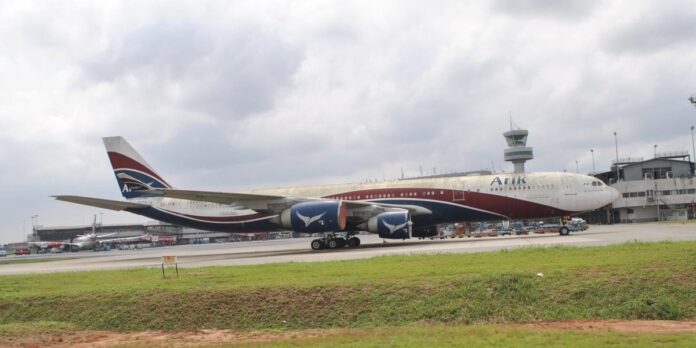In a landmark decision that has sent ripples through the Nigerian aviation industry, the Federal High Court has ruled in favor of Export Development Canada (EDC), granting them the right to repossess and export a CRJ1000 aircraft from Arik Air. The ruling, delivered by Justice Alexander Oluseyi Owoeye on November 27, 2024, marks a significant milestone in Nigeria’s aviation law and the country’s compliance with the international Cape Town Convention.
The aircraft in question, with the registration number 5N-JEE, had been leased to Arik Air by JEM Leasing Limited in 2014. However, the airline ceased operations of the aircraft in 2019, and by 2022, it had fallen into significant financial difficulties, leaving the aircraft in arrears. The EDC, which had assisted in financing the aircraft’s acquisition, held a mortgage over it, and in December 2022, JEM moved to deregister and repossess the aircraft, citing Arik’s default on payments. The EDC, acting as a creditor, subsequently moved to sell the aircraft, a move that sparked fierce opposition from the Economic and Financial Crimes Commission (EFCC).
The EFCC, backed by Nigerian authorities, argued that the sale of the aircraft to Alberta Aviation Capital in 2022 was invalid, raising concerns about the legitimacy of the transaction. However, Justice Owoeye ruled that the sale was indeed lawful and consistent with international conventions governing aircraft leasing. “This decision upholds the principles of the Cape Town Convention and emphasizes the importance of adhering to international agreements,” said an EDC spokesperson following the ruling.
The Cape Town Convention, a treaty designed to standardize aircraft leasing laws and improve global financing for aviation, was adopted by Nigeria in September 2024. This ruling, the first of its kind since Nigeria’s adoption of the convention, has placed the country at a crossroads in its approach to aircraft financing and international disputes. Until now, Nigeria had struggled to adhere to the norms of the convention, particularly in cases involving the return of aircraft in disputes.
In a statement following the ruling, Captain Samuel Caulcrick, the local repossession agent appointed by Merchant Express Cargo, expressed relief and frustration over the protracted legal battle. “This has been a long, difficult journey, not just for us but for all parties involved. The interference by the EFCC and the delays caused by Arik’s owner, Johnson Arumemi-Ikhide, have made this process unnecessarily combative,” Caulcrick said.
Caulcrick, along with Captain Isiaka Oyeshina Akinfenwa, CEO of Merchant Express Cargo, were both involved in the repossession efforts. The pair had previously criticized the EFCC for harassing them during their attempts to retrieve the aircraft, claiming that EFCC officials had resorted to threats and intimidation tactics. Justice Owoeye’s ruling acknowledged these allegations, confirming that EFCC operatives had harassed and even detained both Caulcrick and Akinfenwa. In his judgment, Owoeye ordered that EFCC officials cease all interference with the repossession process, ensuring that the aircraft’s export would proceed without further delay.
The CRJ1000 aircraft, a 2013-built regional jet, is currently in storage at Lagos Airport, awaiting the completion of the repossession process. With Arik Air in receivership since 2017, under the control of Nigeria’s Asset Management Corporation (AMCON), the airline’s operational future remains uncertain. Of the 11 aircraft in Arik’s fleet, only two are currently active. The airline’s ongoing struggles to maintain a functional fleet and the mounting debt have only complicated matters, leading to the eventual court battle over the aircraft.
While the ruling has been hailed as a positive step by international creditors, questions remain about Nigeria’s ability to implement the terms of the Cape Town Convention fully. Aviation Minister Festus Keyamo recently addressed these concerns, acknowledging that Nigeria has faced challenges in aligning its legal processes with international leasing norms. “The legal barriers within Nigeria’s judicial system have often delayed the enforcement of international agreements, but this case shows that we are moving in the right direction,” Keyamo said.
Despite the opposition from the EFCC, the court’s decision has reinforced the importance of global standards in aircraft leasing and financing. It also highlights the legal complexities surrounding the aviation industry in Nigeria, where foreign investors often face significant challenges in reclaiming assets in the event of defaults.
The implications of this ruling extend beyond the immediate case involving Arik Air. As Nigeria moves toward greater compliance with international conventions, it will likely see an increase in foreign investments in its aviation sector, provided the legal framework becomes more predictable and enforceable.
Legal experts suggest that this case could set a precedent for future aircraft repossessions, offering a more structured approach for foreign creditors seeking to recover assets. However, the long-standing issues within Nigeria’s legal system may still pose challenges for the effective application of the Cape Town Convention, especially in complex cases involving state-owned or struggling private enterprises.
The ongoing saga of Arik Air’s financial woes and the repossession of its aircraft underscores the growing tension between the interests of foreign creditors and Nigerian regulatory bodies. As the country grapples with these issues, the aviation industry will need to watch closely to see whether this ruling marks the beginning of a new era of legal accountability and investment security.

